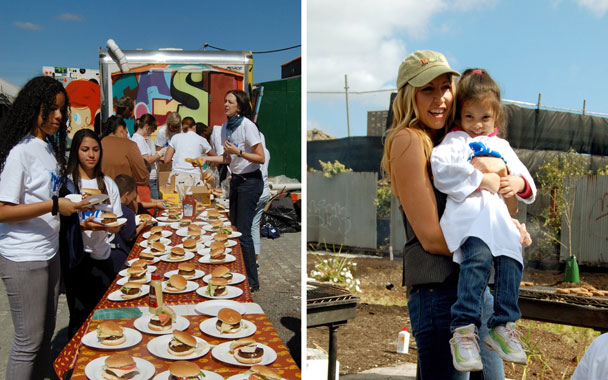Thanks to Paul McCartney’s ex-wife Heather Mills, hundreds of Hunts Point residents had their first taste of vegan “meat” this past Saturday—many without even knowing it. The Back to School Fair, sponsored by the Hunts Point Alliance for Children (HPAC), offered free school supplies, health screenings, and barbecue to kids and parents in this Bronx neighborhood, where half the families live below the poverty line. But posters for the event made no mention of the vegan aspect of the cookout: The signs were printed before Mills offered to donate 1,000 meatless meals for the barbecue—and $1 million worth of vegan food to the community. Britny Rivera, a 13-year-old HPAC volunteer, said, “It’s good, but I’ve never had a veggie burger before. I’m not sure what it’s supposed to taste like.” Her friend, who didn’t realize what she was eating, looked at her half-eaten burger suspiciously and slowly lowered it to her paper plate.
Mills hopes to bring vegetarian food to the masses, starting with underprivileged communities like this one, where nutritious food is hard to come by. She is working on a faux-meat line with Gardein, the veggie protein provider for Morning Star Farms, Trader Joe’s, and Whole Foods, to create everything from veggie chicken breasts (which were also on offer at the barbecue) to vegan-friendly shrimp. “I want to create the largest plant-based food chain in the world,” she explains. (Mills herself is vegan, for health and animal-rights reasons. “Veggie isn’t enough,” she says.)
How will $1 million worth of fake meat—enough to last about three years—benefit the roughly 11,000 residents of Hunts Point? Despite living in the shadow of a massive food distribution hub (the 329-acre Hunts Point Food Distribution Center, which sells wholesale to grocers and restaurateurs and is one of the largest such centers in the world), local people don’t have a decent neighborhood supermarket. Almost a third of the area’s children suffer from environment-related asthma, much of which can be traced to the area’s high concentration of diesel trucks; residents have the worst obesity rates in the city; and nearly half the households earn less than $15,000 annually. So any free, fresh, healthy food is welcome here, and Mills’s vegan fare isn’t bad: The burgers were thicker and heartier than most veggie burgers, with a bit of seitan-like chew; the vegan chicken, which had a similar texture, resembled a boneless, skinless breast in shape and color. HPAC will distribute the food in “healthy cafés,” where neighborhood teens can gather over nutritious meals instead of hanging out on corners. And Adam Green of Rocking the Boat, an after-school program that teaches kids to build boats, says he will save some of the $200 per week that he spends on food for his students.
But even if teenagers were to get hooked on veggie burgers, Mills’s donation certainly won’t turn Hunts Point into a vegan enclave. For one thing, the neighborhood bodegas hardly offer fresh vegetables, let alone an extensive soy foods section, and the local farmers market only operates on summer Saturdays. And as Javier Lopez, who organizes nutritional workshops for the Urban Health Plan’s Project Hope, says of Mills’s meat substitutes, “We’re happy to showcase these foods, but they won’t translate well for the community.” Instead, his group pushes healthier versions of Latino dishes—roast pork, soups, and rice and beans. For him, the best way to get Hunts Point residents on a health kick would be to convince them to substitute salt with Mrs. Dash salt-free seasoning, and to replace Hawaiian Punch with Crystal Light. For now, getting them on the faux meat bandwagon is too big a leap. But if the Mills-generated exposure gets more philanthropists interested in the Hunts Point diet, Lopez says, “The best thing would be for them to put money toward education.”



 Pinterest
Pinterest


